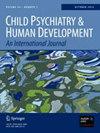Prenatal Exposure to Tobacco and Childhood Cognition and Behavior: Effect Modification by Maternal Folate Intake and Breastfeeding Duration.
IF 2.3
3区 医学
Q2 PSYCHIATRY
Child Psychiatry & Human Development
Pub Date : 2025-02-01
Epub Date: 2023-04-08
DOI:10.1007/s10578-023-01524-x
引用次数: 0
Abstract
In this exploratory analysis, we assessed whether nutrition modified the association between prenatal exposure to tobacco and childhood cognition/behavior among 366 Colorado-based mothers and their offspring (born ≥ 37 weeks with birthweights ≥ 2500 g). Interaction by folate ( 5 months, but not for shorter durations. Our findings support the need for smoking cessation campaigns throughout pregnancy and throughout the postpartum period breastfeeding to reduce neurobehavioral risks in the offspring.
产前接触烟草与儿童期认知和行为:母亲叶酸摄入量和母乳喂养持续时间的影响修正。
在这项探索性分析中,我们对科罗拉多州的 366 位母亲及其后代(出生≥ 37 周,出生体重≥ 2500 克)进行了评估,以确定营养是否会改变产前烟草暴露与儿童认知/行为之间的关系。叶酸的相互作用(5 个月,但在更短的时间内则没有)。我们的研究结果表明,有必要在整个孕期和产后哺乳期开展戒烟运动,以降低后代的神经行为风险。
本文章由计算机程序翻译,如有差异,请以英文原文为准。
求助全文
约1分钟内获得全文
求助全文
来源期刊

Child Psychiatry & Human Development
Multiple-
CiteScore
0.50
自引率
3.40%
发文量
174
期刊介绍:
Child Psychiatry & Human Development is an interdisciplinary international journal serving the groups represented by child and adolescent psychiatry, clinical child/pediatric/family psychology, pediatrics, social science, and human development. The journal publishes research on diagnosis, assessment, treatment, epidemiology, development, advocacy, training, cultural factors, ethics, policy, and professional issues as related to clinical disorders in children, adolescents, and families. The journal publishes peer-reviewed original empirical research in addition to substantive and theoretical reviews.
 求助内容:
求助内容: 应助结果提醒方式:
应助结果提醒方式:


